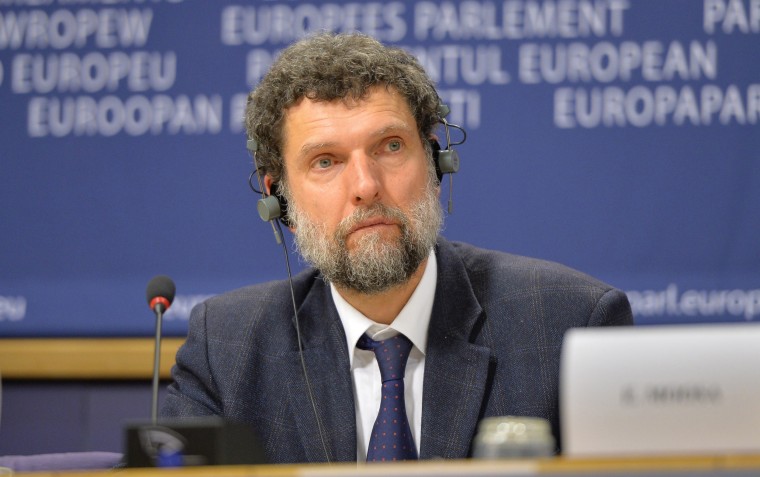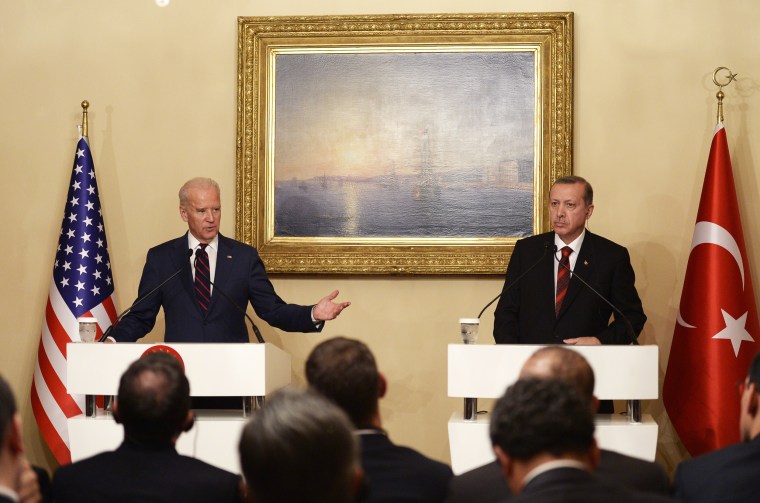President Joseph Biden's pledge to put democracy and human rights at the center of American foreign policy faces an early test Friday in Turkey, a NATO ally that has become increasingly authoritarian over the past decade. Passing this test is crucial given that President Recep Tayyip Erdoğan's repressive rule poses a danger not just for American interests, but also for American citizens.
It would be a mistake to believe that standing up for democratic values and for American citizens will undermine U.S. leverage.
President Donald Trump famously embraced Erdoğan's autocratic abuses, while President Barack Obama mostly ignored them. Unfortunately, both approaches left a permissive international environment for Erdoğan to dismantle Turkish democracy and turn Turkey into a more repressive, aggressive and anti-Western country.
Biden has an immediate opportunity to change course and show support for democratic values in Turkey. On Friday, an Istanbul court resumes its high-profile show trial targeting the prominent Turkish American academic Henri Barkey and the leading Turkish philanthropist and civil society figure Osman Kavala. The men are being tried on charges of committing espionage and aiding the 2016 coup attempt in Ankara. If convicted, they face life sentences.
The seriousness of the charges belies the complete lack of the evidence behind them. With its baseless indictment and denial of due process for the defendants, the entire prosecution is a charade, carried out by a judiciary that is increasingly under the control of the presidency. It is also the latest in a flurry of politically motivated criminal proceedings against U.S. citizens and employees in Turkey in recent years. Biden should raise the case directly with Erdoğan and convey that continuing this unjust prosecution targeting an American citizen will damage U.S.-Turkey ties.
U.S. officials may prefer to avoid prioritizing this case in their agenda with Ankara. They might worry that raising this issue at the highest levels will only antagonize Turkey, weakening U.S. influence with a long-standing strategic partner that is increasingly straying from NATO and toward the orbit of U.S. adversaries like Russia and China. Others might argue that addressing Turkey's disruptive regional behavior, such as threatening Greece and Cyprus with its navy in the Eastern Mediterranean, should take priority.

But it would be a mistake to believe that standing up for democratic values and for American citizens will undermine U.S. leverage or that Erdoğan's domestic repression is unconnected to his aggression abroad. Turkey will act as an effective member of the transatlantic alliance only when it respects the values for which the alliance stands. Biden should make it clear to Erdoğan that respect for the rule of law and an end to state-fostered anti-Americanism are nonnegotiable prerequisites for a better U.S.-Turkish relationship.
The list of injustices in today's Turkey is long, and the Biden administration has a crowded agenda of strategic issues and disputes to address with it. But the Kavala-Barkey case deserves Biden's engagement for several reasons.
For starters, it targets a U.S. citizen and weaponizes anti-American conspiracy theories. The indictment charges Barkey, a Lehigh University professor, with working with coup plotters and committing espionage. Instead of evidence, it offers repeated references to Barkey's ties — as an academic, a think tanker and a former government official — to the U.S. foreign policy community to link him to the conspiracy theory systematically propagated by pro-Erdoğan circles that the United States was behind the 2016 coup.
Unlike his co-defendant, Kavala, Barkey is not in a Turkish prison, and he is being tried in absentia. But he is not free from danger. Turkey has a record of abusing Interpol notices, and given the seriousness of the charges, Barkey could face arrest if he travels to certain countries. Beyond that, his conviction would give Turkey's legal imprimatur to the false narrative about U.S. involvement in the coup attempt, and it would make other Americans vulnerable to such politicized targeting.
Washington has too often looked away when Erdoğan has scapegoated the United States to deflect blame for Turkey’s political, economic and diplomatic crises. Yesterday, the State Department took an important step to counter such polemics and publicly denounced Turkey’s assertions about U.S. involvement in the 2016 coup attempt. But that isn’t enough. The U.S. must also speak up clearly about cases like that of Barkey and Kavala, which uses such theories as a basis to prosecute Turkish and American citizens.
More broadly, the case is a direct assault on liberal civil society in Turkey, which is among the few remaining bastions of pro-democracy activism under Erdoğan. Kavala is one of Turkey's most respected champions of pluralism, human rights and peacemaking — values that directly counter Erdoğan's intolerant, repressive and aggressive rule. Indeed, observers argue that Erdoğan targets Kavala precisely to intimidate other activists who share his values. A free civil society is essential if Turkey is to return to a path of democratization.
Kavala's plight is also emblematic of Turkey's increasingly brazen defiance of domestic and international law — a trend that should alarm the U.S. and Europe. Even though there is no evidence of wrongdoing, the steadfastly peaceful Kavala has been kept in solitary confinement in a maximum-security prison designed to host Turkey's most vicious criminals. In 2019, the European Court of Human Rights ruled that the charges against Kavala lacked any evidence and ordered his immediate release. Yet Turkey, which is bound to implement the court's decisions, continues to defy the order, part of a trend of openly questioning or ignoring its international commitments.
Washington should promote democracy, human rights and the rule of law around the globe, not only to advance U.S. interests and universal values, but also to protect U.S. citizens from unjust treatment at the hands of autocrats. Greater attention to these issues in Turkey is long overdue, but Biden has a chance to change that. The Kavala-Barkey case is a good place to start.



